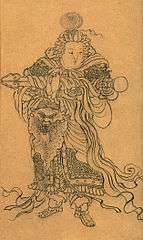Skanda (Buddhism)
| Skanda | |||||||||||||
_(15948243350).jpg) | |||||||||||||
| Chinese name | |||||||||||||
|---|---|---|---|---|---|---|---|---|---|---|---|---|---|
| Traditional Chinese | 韋馱 | ||||||||||||
| Simplified Chinese | 韦驮 | ||||||||||||
| Literal meaning | Dharma Protector | ||||||||||||
| |||||||||||||
| Alternative Chinese name | |||||||||||||
| Traditional Chinese | 護法韋馱尊天菩薩 | ||||||||||||
| Simplified Chinese | 护法韦驮尊天菩萨 | ||||||||||||
| Literal meaning | Honored Dharma Protector Skanda Bodhisattva | ||||||||||||
| |||||||||||||
| Tibetan name | |||||||||||||
| Tibetan | གདོང་དྲུག་ | ||||||||||||
| |||||||||||||
| Vietnamese name | |||||||||||||
| Vietnamese alphabet | Hộ Pháp Vi Đà | ||||||||||||
| Korean name | |||||||||||||
| Hangul | 위타천 | ||||||||||||
| |||||||||||||
| Mongolian name | |||||||||||||
| Mongolian | Арван Хоёр Нууд | ||||||||||||
| Japanese name | |||||||||||||
| Kanji | 韋駄天 | ||||||||||||
| |||||||||||||
| Tamil name | |||||||||||||
| Tamil | Murugan, Kumaran, Kandan, Vadivelan | ||||||||||||
| Sanskrit name | |||||||||||||
| Sanskrit | Skanda | ||||||||||||
Skanda, also known as Wei Tuo (Chinese: 韋馱), is a Mahayana bodhisattva regarded as a devoted guardian of Buddhist monasteries who guards the Buddhist teachings. He is also sometimes called in the Chinese tradition "Hufa Weituo Zuntian Pusa", meaning "Honored Dharma Protector Skanda Bodhisattva", because he is the leader of the twenty-four celestial guardian deities mentioned in the Golden Light Sutra.
In Chinese temples, Skanda faces the statue of the Buddha in the main shrine. In others, he is on the far right of the main shrine, whereas on the left is his counterpart, Sangharama (personified as the historical general Guan Yu). In Chinese sutras, his image is found at the end of the sutra, a reminder of his vow to protect and preserve the teachings.
According to legends, Skanda was the son of a virtuous king who had complete faith in Buddha's teachings. When the Buddha entered nirvana, the Buddha instructed Skanda to guard the Dharma. It was his duty to protect members of the sangha when they are disturbed by Mara, the tempter, and also to resolve conflicts amongst members of the sangha. A few days after the Buddha's passing and cremation, evil demons stole his relics. Skanda's vow of protecting the faith and Dharma was proven when he managed to defeat the evil demons and returned the relics.
Origins
Stories vary on how Skanda was accepted into the traditional Chinese Buddhist pantheon. Some have proposed that Skanda's features were adapted from a Chinese deity who appeared in the Chinese classical Ming novel Canonization of the Gods. However, the existence of illustrated Skanda images predating the Ming Dynasty set his origins back to an earlier period in the development of Chinese Buddhism.
Skanda is described as a young man fully clad in the armor and headgear of a Chinese general, and is usually leaning on a vajra staff. Some suggest that Skanda may have come from Hinduism as the war deity Kartikeya / Muruga (Tamil), who bears the title Skanda. Others point out that Skanda might also be a manifestation of Vajrapani, a bodhisattva who bears some relations to Skanda because they both wield vajras as weapons, are portrayed with flaming halos, and are both heavenly protectors of Buddhism. Skanda may be connected through Vajrapani through a theory to his connection to Greco-Buddhism, as Wei Tuo's image is reminiscent of the Heracles depiction of Vajrapani.
Although Skanda is only a deva, he is very often addressed as a bodhisattva.
As Miao Shan's lover
When the bodhisattva Avalokitesvara was reincarnated as the princess Miao Shan, Skanda (known as Wei Tuo in this story) was one of her cruel father's generals. He loved Miao Shan but realized he could not possibly be a proper partner to her, since she was a pure person. However, Wei Tuo was inspired by Miao Shan's kindness so he decided to stay faithful and devoted to Miao Shan, even if she wasn't his wife. The two escaped Miao Shan's father, and the general-suitor helped build Miao Shan a temple and a kingdom of her own. Soon however, the cruel king found them and killed them both. The general, because of his devotion to Guan Yin, transformed into a bodhisattva himself, who vowed to always serve and protect Guan Yin. His appearance as a Chinese general is the direct forbear to his connection with Miao Shan.
As a warrior
Another story says that Miao Shan was told to be killed by her grandmother. Her grandmother forced Miao Shan to commit suicide by leaping into the sea because she was thought to have been an incarnation of a demon, when in fact she was not. The emperor told a loyal soldier named Luo Ping to pretend to throw Miao Shan to the ocean. He brought her with Yin Ma, the mother of Wei Tuo to her village. Years passed, an evil fish demon came. A disloyal soldier named Huo Yi, was sent from the fish demon to kill Miao Shan. The fish demon wanted revenge on Miao Shan because she was the incarnation of Ci Hang Da Shi, a Buddhist deva that put her in a lotus pond. Huo Yi and his troops went to the village where Miao Shan and Wei Tuo lived and fought. Huo Yi's son killed Wei Tuo. After Miao Shan became the bodhisattva Avalokitesvara, she made Skanda a bodhisattva guardian. He became a bodhisattva because he took care of Miao Shan and loved her as a sister.
According to the lunar calendar, his birthday is at the 3rd day of the 6th lunar month.
Gallery
 Skanda as portrayed by Zhao Mengfu during the Yuan Dynasty.
Skanda as portrayed by Zhao Mengfu during the Yuan Dynasty.- Skanda at Beijing Miaoying Temple
 Wei Tuo at Yonghe Temple, Beijing
Wei Tuo at Yonghe Temple, Beijing
See also
- Dharmapala
- Śakra (Buddhism)
- Jetsun Dolma
- Kartikay (Hindu god of war)
- Kartikkeya (Hindu god of war)
| Wikimedia Commons has media related to Skanda (Buddhist deity). |
